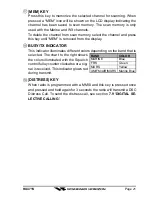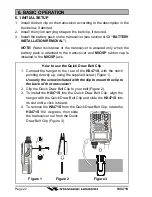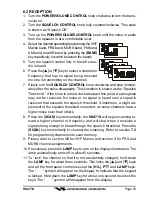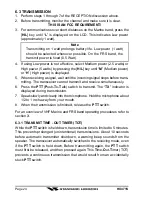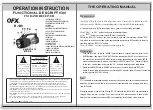
HX471S
Page 35
10. OPERATING PRACTICES
10.1 EMERGENCY (CHANNEL 16 USE)
Channel 16 is known as the Hail and Distress Channel. An emergency may
be defined as a threat to life or property. In such instances, be sure the
transceiver is on and set to CHANNEL 16. Then use the following proce-
dure:
1. Press the microphone push-to-talk switch and say “
Mayday
,
Mayday
,
Mayday
. This is , , ” (your vessel’s name).
2. Then repeat once: “
Mayday
, ” (your vessel’s name).
3. Now report your position in latitude/longitude, or by giving a true or mag-
netic bearing (state which) to a well-known landmark such as a naviga-
tion aid or geographic feature such as an island or harbor entry.
4. Explain the nature of your distress (sinking, collision, aground, fire, heart
attack, life-threatening injury, etc.).
5. State the kind of assistance your desire (pumps, medical aid, etc.).
6. Report the number of persons aboard and condition of any injured.
7. Estimate the present seaworthiness and condition of your vessel.
8. Give your vessel’s description: length, design (power or sail), color and
other distinguishing marks. The total transmission should not exceed 1
minute.
9. End the message by saying “
OVER
”. Release the microphone button
and listen.
10. If there is no answer, repeat the above procedure. If there is still no
response, try another channel.
10.2 CALLING ANOTHER VESSEL (CHANNEL 16 OR 9)
Channel 16 may be used for initial contact (hailing) with another vessel.
However, its most important use is for emergency messages. This channel
must be monitored at all times except when actually using another channel.
It is monitored by the U.S. and Canadian Coast Guards and by other ves-
sels.
Use of channel 16 for hailing must be limited to initial contact
only.
Calling should not exceed 30 seconds, but may be repeated 3 times at
2-minute intervals. In areas of heavy radio traffic, congestion on channel 16
resulting from its use as a hailing channel can be reduced significantly in
U.S. waters by using
Channel 9
as the initial contact (hailing) channel for
non-emergency communications. Here, also, calling time should not exceed
30 seconds but may be repeated 3 times at 2-minute intervals.

